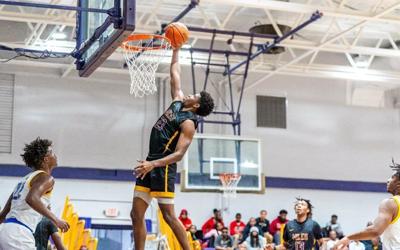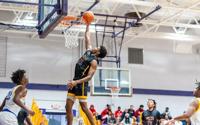
Rylen Walker argues the NCAA’s rules will prevent him from playing Division II basketball during the upcoming 2025-26 season.
BATON ROUGE, La. – A men’s Division II basketball player has filed a federal antitrust lawsuit against the NCAA arguing its junior college bylaws restrict him and others from “fully utilizing” their eligibility.
Plaintiff Rylen Walker, a Baton Rouge resident, filed his 26-page complaint June 13 in the U.S. District Court for the Middle District of Louisiana.
Walker played NCAA Division II college basketball at Miles College in Fairfield, Ala., for the past two seasons. Before playing at Miles, he played two seasons of junior college, or JUCO, basketball: one at Mississippi Delta Community College and one at Hinds Community College.
Walker filed a motion for preliminary injunction against the National Collegiate Athletic Association, or NCAA, the same day as his complaint. He argues the NCAA’s rules will prevent him from playing Division II basketball during the upcoming 2025-26 season.
The NCAA is a member-led organization that governs college athletics in the U.S. It’s responsible for setting rules, organizing championships, and providing student-athlete support.
In both filings, Walker contends the NCAA’s JUCO Eligibility Limitations Bylaws constitute “unlawful restraints on trade” in violation of the Sherman Act. The federal law aims to ensure fair competition and protect consumers.
He specifically challenges the NCAA’s 10-Semester/15-Quarter Rule and Intercollegiate Competition Rule.
Under the rules, time spent competing for a JUCO – even though such institutions are not part of the NCAA and their student-athletes thus receive none of the NCAA’s benefits – count as “intercollegiate competition” and start the student-athlete’s four-season “eligibility clock.”
“The JUCO Eligibility Limitation Bylaws arbitrarily limit participation time and create unequal standards for student-athletes who begin their careers at non-NCAA institutions, discouraging student-athletes from attending JUCOs to prepare for four-year colleges and to punish those who do so, even though JUCOs may provide such student-athletes with necessary academic and other opportunities,” the complaint states.
Walker argues the JUCO bylaws also deprive athletes such as himself of access to name, image, and likeness, or NIL, compensation and scholarship opportunities.
“Despite the NCAA recently issuing a blanket waiver extending eligibility for former JUCO athletes to compete in the 2025-2026 academic year for NCAA Division I institutions (in response to the ruling in Pavia v. NCAA discussed herein), the NCAA has refused to provide equivalent relief to former JUCO athletes to compete for NCAA Division II institutions next year,” the complaint states.
“This refusal exacerbates the existing inequity and further suppresses competition in the student-athlete labor market.”
The bylaws, Walker argues, “actively suppress” competition, distort the labor market for college basketball players, diminish athlete welfare, and weaken the quality of play available to the public.
“The rules directly conflict with the NCAA’s stated mission of supporting athlete well-being and constitute precisely the kind of anti-competitive restraint the antitrust laws are designed to prohibit,” the complaint states.
Walker alleges the limitations will cause “irreparable harm” to his athletic career.
“Unless enjoined, the effect of the NCAA’s anti-competitive conduct will result in Petitioner being punished and penalized for having attended JUCO,” the filing states. “It will also permanently deprive him of a once-in-a-lifetime opportunity to profit from his NIL and the opportunity to enhance his career and reputation by playing another year of Division II basketball.”
Walker points out in his filings that the “market realities” of college sports have changed over the last 40 years, leading the U.S. Supreme Court in 2021 to characterize the NCAA as a “sprawling enterprise” that generates billions in revenue each year.
Justice Brett Kavanaugh described the NCAA as such in his concurring opinion in National Collegiate Athletic Association v. Alston. He said the NCAA’s previous restrictions on athlete compensation were a clear violation of antitrust laws and that it was not above the law.
NCAA v. Alston paved the way for college athletes to receive compensation for use of their names, images, and likenesses. A unanimous Supreme Court ruled the NCAA’s rules violated antitrust law.
“Although the NCAA is a non-profit organization, the transactions that member institutions make with college athletes yield significant financial revenue for the member institutions and have significant effects on the future earning potential of those college basketball players,” Walker’s complaint states.
“Student athletes playing basketball outside of the NCAA monopoly have no meaningful opportunity to profit from their NIL. Thus, athletes who begin their basketball careers at JUCOs are effectively denied meaningful opportunities to profit from their NIL as a result of this non-NCAA athletic participation.”
Walker contends the NCAA’s JUCO bylaws restrain college athletes from improving their economic opportunity, personal growth, and well-being with NIL opportunities.
“In essence, the JUCO Eligibility Limitation Bylaws amount to no more than an agreement to limit the amount of time athletes may play Division II basketball because they have chosen to attend a non-NCAA institution prior to transferring to a NCAA Division II institution,” the complaint states. “These same restrictions are not placed on athletes who choose to delay entry to a NCAA Division II institution to attend prep school, serve in the military, or even to compete professionally in another sport.
“Preventing college athletes from competing in NCAA basketball games solely because they decided in their own best interest to start college at a non-NCAA institution has no relationship with the amateur status of those athletes.”
Walker seeks a ruling that enforcement of the JUCO bylaws violates the federal antitrust law; a permanent injunction enjoining the NCAA from continuing to violate federal law and from enforcing its JUCO bylaws; award him additional Division II competition and eligibility; and costs, including attorneys’ fees.
In his two seasons at Miles, Walker has averaged 6.1 points and 2.6 rebounds per game.
Baton Rouge law firm Breazeale Sachse & Wilson LLP is representing the plaintiff.







